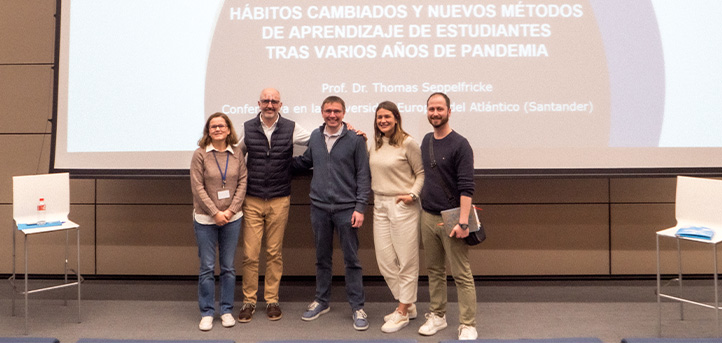The European University of the Atlantic (UNEATLANTICO) was visited by Dr. Thomas Seppelfricke, professor of industrial psychology at the German Hochschule Fresenius University of Applied Sciences, who gave two lectures for students of the degrees in Psychology (PSI), Primary Education (EP) and Business Administration and Management (ADE).
The first lecture was entitled “Less work, more free time? On the pros and cons of the concept of the four-day work week”, was aimed at students of the Psychology and Business Administration and Management degrees. It took place on March 26 in the university’s auditorium and discussed what it would mean to work only 4 days a week and whether it would be optimal or not. During it, Seppelfricke opened a space for dialogue with the students present to discuss the topic. This interaction provided personal growth for the UNEATLANTICO students who, from their diverse perspectives, were able to better understand the advantages that arise in societies where the four-day work week is already a reality.
On March 27, the second conference entitled “Changed habits and new methods of student learning after several years of pandemic” was given, this time aimed at students of Primary Education and Psychology. In this lecture, Dr. spoke in depth about the changes in habits brought about by the pandemic, how it affected education and the new learning methods of students after several years of pandemic. He spoke about a study that was conducted at his university in spring 2021 in which the sentimental state of students as well as their academic performance and post-pandemic demands on studies were investigated.
Results of the study
The results of the study showed that the students showed a worsening in several skills. For example, 87% of students experienced problems in communication. Also, 78% of the students had difficulties when doing group work.
On the other hand, the study also showed that students find this type of study, i.e. studying from home or remotely, monotonous and boring.
Finally, students have found that, post-pandemic, 70% of them have to “learn how to learn”. They also noted that returning to their pre-pandemic study habits has not been easy.
It is worth noting that both conferences demonstrate the practical spirit and closeness to the working world with which UNEATLANTICO students complement their training. In addition, the participation of the German psychologist is a great demonstration of the international vision and vocation with which UNEATLANTICO students are trained.


